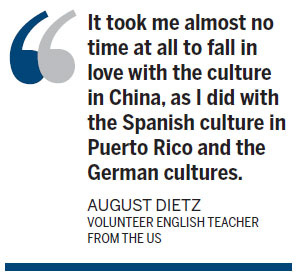He used to teach engineers. Now he devotes his time to improving the English of young people eager to improve their chances of finding a job. He tells Li Yang how he began his journey to Yangshuo.
August Dietz had a very clear vision in 2005. He says it was as if he saw a plane flying in the skies before him, and it was carrying a long red banner that said: "Go to China".
The 83-year-old retired engineering teacher from Arizona, United States, obeyed the call, and he has been teaching English in Yangshuo as a volunteer for the last seven years.
He describes his vision as "a strange feeling" other than illusion or daydream.
"It was like God told me to go to China. When this feeling came, I had to be honest as a Christian," he says.
"My family had lived in different countries and experienced different cultures. They supported my 'crazy idea' very much, because they understood my feelings."

A friend working in a Nanjing-based university asked him to take her place as a substitute teacher when her one-year term came to an end in 2006, but education administrators turned him down because of his age.
He next spent much time on the Internet checking the possibilities and made a long list of Chinese telephone numbers, behind which he believed were jobs for him.
He called the first number and an English-speaking Chinese businessman operating foreign language schools in Yangshuo of the Guangxi Zhuang autonomous region answered his call.
"Something strange happened and there was immediate chemistry between us," he recalls.
"He said he could not hire me but asked if I would consider coming to teach English as a volunteer."
That first call became the only call.
He arrived in Yangshuo with his wife Joanne in late 2006, leaving his three daughters, 12 grandchildren and 14 great-grandchildren at home.
"It took me almost no time at all to fall in love with the culture in China, as I did with the Spanish culture in Puerto Rico and the German cultures."
His family had lived in different countries from the Grand Bahamas and Puerto Rico in the Caribbean Sea to Wiesbaden in Germany. He had worked as an air defense system technician first in the Caribbean in the 1950s and later as a consultant for the US air force headquarters in Europe in the 1960s.
In Grand Bahamas, his family members were the only whites in an entirely black community, and in Puerto Rico, everyone spoke Spanish.
"My initial attitude was that 'the people on the islands were poor and I am a rich American'. Later, I realized how humiliated I was because I found out that the local people knew more about how to live in difficult conditions than Americans. That's when I knew there is so much to learn beyond American culture."
This epiphany changed his mindset and paved the way toward an easier tenure in Germany and later, China. Dietz believes all cultures are interrelated and regards his stay in Germany as an important stage in his life during which he saw the connection more clearly.
For example, he points out that Georg Hegel's thoughts influenced not only the West but also Russia and China through theories of Karl Marx.
He studied Eastern religions, Chinese philosophy and history after coming to China and regards himself as a student of China that way.
He teaches about 15 hours every week in Yangshuo now, living off his US pension.
Seven years ago, his students were mostly successful businessmen from across the country, who came to improve their English. Now most of the students are younger and from places not far from Yangshuo and they come to learn English to find a job.
He has taught more than 100 students and often goes to Shenzhen, Wenzhou and Shanghai to attend get-togethers organized by his students.
He also trains his students how to teach English. That his students can teach English is the largest reward for him.
"He is very honest and generous. He is like a grandfather to a very large family. He refuses to take our money because he says money ruins the volunteer spirit," says one of his students, a young lady named Sun who is a tour guide in Guilin.
The saddest thing for Dietz was when his wife Joanne died in Yangshuo in 2010 at the age of 83. He grieved for her for nearly two years until he told himself: "I don't like being single".
He found his second wife, Zhang Lianfang, a 63-year-old from Changsha in Hunan province, through a matchmaking website.
Dietz sums up his life in Yangshuo as "been there, done that", but the spritely grandpa volunteer thinks the best is yet to be.
Huo Yan and Long Linxiu contributed to the story.
Contact the writer at liyang@chinadaily.com.cn.
|
August Dietz talks about his life as a volunteer English teacher in Yangshuo, Guangxi Zhuang autonomous region. Huo Yan / China Daily |